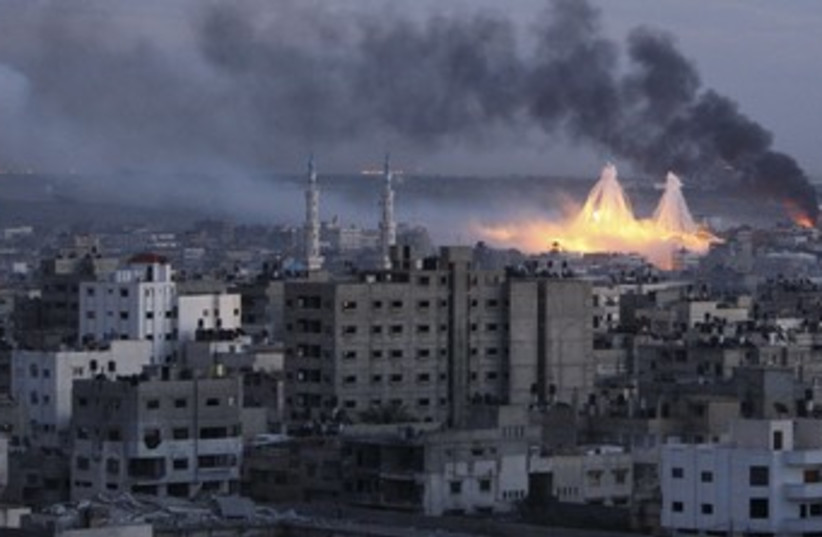Russian forces were accused of indiscriminately using phosphorus and thermobaric munitions by the Ukrainian parliament's commissioner for human rights on Tuesday, and both Ukrainian and Russian troops were being investigated for use of cluster bombs in populated areas, according to UN political affairs chief Rosemary DiCarlo.
White Phosphorus and Thermobaric weapons
Lyudmyla Denisova, the Ukrainian parliament's commissioner for human rights, alleged that the Russian military had used TOS-1 Heavy Flamethrower Systems to launch both phosphorus and thermobaric munitions against sites near Kharkiv. She claimed that three phosphorus shells were fired.
Denisova claims to have collected testimonies from Ukrainian servicemen who have noted damage to the environment consistent with the munitions and allegedly captured Russian equipment. The Ukrainian military published several testimonies
"According to military medics, they had to evacuate soldiers who were wounded by the use of these munitions," wrote Denisova. "Many of them had burns, some suffered from the effects of white phosphorus vapors entering the airways."
While white phosphorus and thermobaric weapons are not explicitly banned under international treaties and customary law, "due to the indiscriminate nature of these weapons, they are prohibited from being used near settlements," Denisova noted. "The use of such weapons by enemy troops against civilians is a crime against humanity and a violation of the 1949 Geneva Conventions and the 1979 UN Resolution. "

The human rights commissioner claimed that the munitions were deliberately used against civilian objects, including a dairy plant.
"I appeal to the UN Commission for Investigation Human Rights Violations during Russia's military invasion of Ukraine and the expert mission set up by the OSCE participating states under the Moscow mechanism to take into account these war crimes and crimes against humanity and human rights in Ukraine," said Denisova
Cluster munitions
UN political affairs chief Rosemary DiCarlo said the United Nations had received credible allegations "that Russian forces have used cluster munitions in populated areas at least 24 times." She said allegations that Ukrainian forces have used such weapons were also being investigated.
"Two missiles with cluster mines landed on the territory of Velykomykhailivska community of Dnipropetrovsk region," claimed Denisova. "One woman was killed when she picked up a cluster munition."
Earlier, on March 4, NATO Secretary-General Jens Stoltenberg said "We have seen the use of cluster bombs and we have seen reports of use of other types of weapons which would be in violation of international law."
Indiscriminate attack and international law
Russia's UN Ambassador Vassily Nebenzia then told the Security Council that Russian troops are not targeting civilians, dismissing accusations of abuse as lies.
"We are not shooting against the civilian targets in order to save as many as civilians possible. This is precisely why we're not advancing as fast as many expected," Nebenzia told the Security Council.
Thermobaric weapons, also called fuel-air explosives or aerosol bombs, are a type of explosive that uses aerosolized fuel - fuel droplets suspended in air - to ignite oxygen to create intense heat and pressure waves. Because thermobaric bombs suck in much of the oxygen in the area, they can suffocate people sheltering in bunkers. They can also suck the air from people's lungs, or even burst them due to the pressure wave. Thermobaric weapons impact a very wide area, and thereby quite indiscriminate in the damage they inflict.
There have been many reports of Russia using vehicle-borne thermobaric rocket launchers against Ukraine since it invaded on February 24. However, there also have been reports of Ukrainian forces using thermobaric weapons in the form of shoulder-launched weapons systems.
White phosphorus is a material commonly used in smokescreen and illumination rounds. Such munitions are generally permitted under international law. White Phosphorus can also be used in incendiary munitions, which under the 1980 Protocol III on Incendiary Weapons of the Convention on Certain Conventional Weapons is prohibited to be used on or near civilian objects.
Under the 2008 Convention on Cluster Munitions, it is prohibited to use, develop, produce, stockpile or transfer cluster munitions, but Russia and Ukraine are not parties to the treaty.
It is a principle of International Humanitarian Law (IHL) that military actions must target military objects. Any person who uses a weapon indiscriminately or deliberately against civilians is in violation of war crimes.
All appropriate efforts to avoid civilian casualties must be taken, and a reasonable commander must weigh the risk of potential damage to civilian objects against the military value and threat of a valid enemy target.
Reuters contributed to this report.
